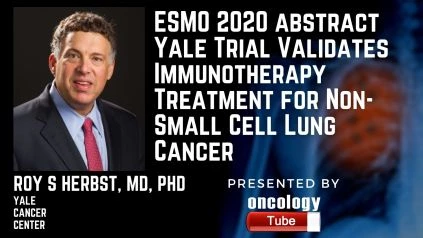Roy S Herbst, MD, Ph.D. of the Yale School of Medicine and Yale Cancer Center discusses ESMO 2020 abstract Yale Trial Validates Immunotherapy Treatment for Non-Small Cell Lung Cancer.
New Haven, Conn. Atezolizumab, the immunotherapy drug, improves survival over standard survival.
For several patients with newly diagnosed non-small cell lung cancer ( NSCLC), chemotherapy,
A new study led by researchers from the Yale Cancer Center (YCC) shows that. The conclusions, from a
Step 3 global randomized clinical trial, published today in the New England Journal of
Medicine, assistance with the U.S. The approval of the medication by the Food and Drug Administration for this in May, an indicator.
Atezolizumab is a drug called a “checkpoint inhibitor” designed to aid cells of the immune system called T cells.
Cancer is killed by cells. On the surface of tumor cells, the drug targets a protein known as PD-L1,
That can signal not to attack T cells, so stopping this signaling can unleash the T cells against it.
Yeah, cancer.
The study enrolled 554 patients with metastatic NSCLC stage 4 tumors lacking mutations in
EGFR or ALK genes (since other medicines handle tumors with such mutations better).
Of the 205 patients whose tumors showed a high expression of PD-L1, the overall median was PD-L1,
For those given atezolizumab, survival was 20 months and for those given atezolizumab, survival was 13 months.
Normal chemotherapy on the basis of platinum. Median survival free of development increased to eight months
For participants receiving atezolizumab versus those receiving chemotherapy for five months.
The study also examined the performance of atezolizumab versus chemotherapy among individuals whose care was
Blood has demonstrated strong tumor mutational burden markers, with strong levels of genetic mutations in
Cancer DNA scraps that circulate in the blood. Tumor mutational mutations in certain forms of cancer
The burden correlates with a better immunotherapy answer.
Atezolizumab is the first PD-L1 inhibitor which has been shown to defeat first-line chemotherapy.
Among people with NSCLC, monotherapy. Pembrolizumab, a PD-11 inhibitor agent, this was previously approved for the protein on the surface of T cells to which PD-L1 binds indicator.
In 2012 and 2012, Yale scientists led the first phase one clinical trial of atezolizumab in this population.
The drug candidate was pushed all the way to the phase 3 global trial. The current clinical trials are combinations of atezolizumab with other medications for the treatment of individuals with NSCLC are now being examined.

